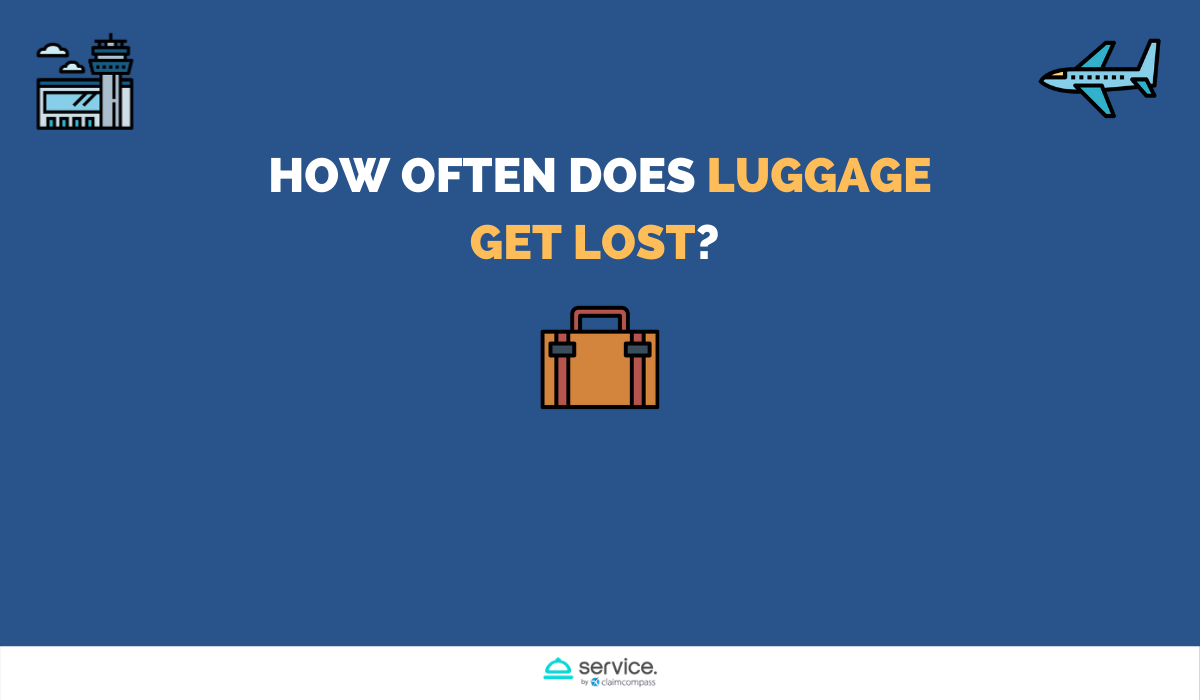How Often Does Luggage Get Lost?
Over 4 billion bags are checked each year. But because of human error and technical issues, it mishandles 28 million each year.

Up until the COVID-19 pandemic of 2020 that put a halt to air travel, the number of air passengers and checked bags kept growing from one year to the next.
According to SITA’s 2019 report, in 2018, 4.36 billion travelers checked in more than 4.27 billion bags. The leading provider of IT services to over 400 airlines worldwide further highlighted that over 28 million bags are mishandled each year.
In this short guide, you’ll learn:
- How many bags don’t make it to the luggage carousel
- Why there are so many mishandled bags each year
- How you can reduce the chances of having your luggage lost
How many bags are lost by airlines every year?
Out of the 28 million mishandled bags, 5% are lost each year. This means that there are 1.4 million lost luggage every year.
By comparison, 18% are damaged and 77% are delayed, which means that 5,040,000 baggage get damaged during transportation and 21,560,000 checked bags are not returned in due time to their owners.
On average, for every 1,000 passengers, 5.69 bags are mishandled. And the number keeps growing by 2.2% year on year, from 5.57 the previous year.
While those numbers paint a pessimistic picture of the state of baggage handling worldwide, there are signs that point to a brighter future. Indeed, IATA’s Resolution 753 states that bags should be tracked from start to finish, with the goal to reduce the number of mishandled bags and resulting baggage claims.
Why do bags get lost during air travel?
Lost bags are checked bags that are initially delayed before being declared lost by the airline, so we need to first look at the reasons for delayed bags. As you’ll see, human error is often involved.
Transfer mishandlings are the primary cause of delayed bags, with 46% of bags being delayed due to an issue during the transfer of the luggage during a layover. Travelers whose itinerary includes a connecting flight are indeed more likely to reach their final destination without their luggage. Baggage handlers indeed need time to move luggage from one aircraft to another and technical issues also have a part in this.
Loading errors make up for 19% of delayed bags. Considering the previous point, it’s safe to assume that itineraries that include a connection increase the likelihood of luggage being delayed or lost.
The third reason why luggage gets lost is ticketing error during check-in. Indeed, 16% of delayed luggage became so because the checked luggage didn’t get the right tag, causing the bag to be sent somewhere else than its owner’s final destination.
An indirect cause of lost luggage is the ever increasing number of air travelers (prior to 2020, that is). Since 2007, the number of air passengers has soared 76% to reach an astounding 4.36 billion in 2018. Airport infrastructure have had a hard time keeping up with this increase. And yet, it’s worth noting that since 2007, the number of mishandled bags have decreased, reaching a low point in 2013. Since then, however, it has been steadily increasing.
How to avoid lost and delayed baggage?
The easiest way to prevent the airline from losing your bag is to travel with a carry-on only, rather than with a checked bag. Too many things can happen when your bag isn’t with you, from luggage tags errors to transfer issues during a connection, be it on domestic or international flights.
But sometimes, you need to travel with more than a carry-on bag, right? In that case, here are some tips:
- When preparing your luggage, make it standout with a colorful ribbon or duct tape so that you can easily spot it at the airport and on the baggage carousel
- Attach a tag with your contact information to your luggage: indicate at least your phone number so that wherever your bag ends up, someone may easily contact you
- At check-in, double-check the luggage tag and make sure that the barcode is readable before the airport agent puts your bag on the conveyor belt for it to be loaded on the plane
You can also take measures to limit the damage down by a delayed or lost luggage. For instance, pack your toiletries in your carry-on, so that you’re sure to have them at your final destination.
What to do if the airline lost your luggage?
Despite your precautions, it’s possible that your luggage won’t make it to your destination. Know that if this happens, you’re entitled to compensation. This reimbursement cap depends on the type of itinerary:
- Up to $3,500 on domestic flights in the United States, as stated by the Department of Transportation (DOT)
- Up to $1,800 on international flights, as per the Montreal Convention of 1999
(Learn how to claim compensation for lost luggage)
The airline will determine the compensation amount based on the original purchase price of the items in your luggage (minus depreciation), so you want to be able to justify the value of your items whenever possible. You can also request the reimbursement of the checked baggage fees.
ClaimCompass can handle lost luggage claims on your behalf. It takes only a few minutes to submit your claim!
